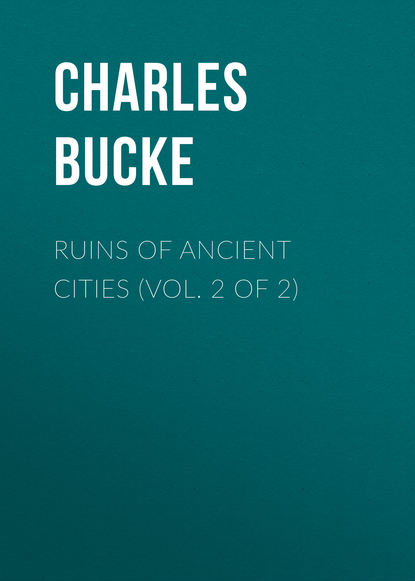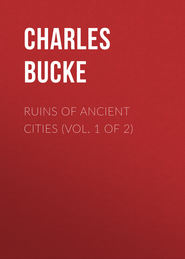По всем вопросам обращайтесь на: info@litportal.ru
(©) 2003-2024.
✖
Ruins of Ancient Cities (Vol. 2 of 2)
Настройки чтения
Размер шрифта
Высота строк
Поля
Livy; Rollin; Swinburne; Parker; Knight; Hamilton.
220
Dodwell.
221
Clarke.
222
A stadium was a place in the form of a circus, for the running of men and horses.
223
Williams.
224
Pausanias; Barthelemy; Rollin; Wheler; Clarke; Dodwell; Williams; Byron.
225
Gen. x. ver. 15.
226
Gen. xlix. ver. 13.
227
Drummond’s Origines, vol. iii. p. 97. Homer makes the Phœnician woman speak, of whom mention is made in the Odyssey b. xv. – “I glory to be of Sidon abounding in brass, and am the daughter of the wealthy Arybas.”
228
Zidon-rabbah: ch. xi. v. 8.
229
“Neither did Ashur drive out the inhabitants of Accho, nor the inhabitants of Zidon.” – Judges i. 31.
230
“Now, therefore, command thou that they hew me cedar trees out of Lebanon; and my servants shall be with thy servants; and unto thee I will give hire for thy servants, according to all that they shall appoint; for thou knowest that there is not amongst us any that has skill to hew timber like unto the Sidonians.” – 1 Kings, ch. x. v. 6.
231
Dictys Cretensis acquaints us that Paris returned not directly to Troy after the rape of Helen, but fetched a compass, probably to avoid pursuit. He touched at Sidon, where he surprised the king of Phœnicia by night, and carried off many of his treasures and captives, among which probably were these Sidonian women. – Pope.
232
“The common voyce and fame runneth, that there arrived certain merchants, in a ship laden with nitre, in the mouth of the river; and beeing landed, minded to seath their victuals upon the shore, and the very sands: but that they wanted other stones, to serve as trivets, to beare up their pans and cauldrons over the fire, they made shift with certaine pieces of sal-nitre out of the ship, to support the said pans, and so made fire underneath; which being once afire among the sand and gravell of the shore, they might perceive a certaine cleare liquor run from under the fire, in very streams, and hereupon they say came the first invention of making glass.” —Philemon Howard, Pliny, xxxvi. c. 26.
233
Book viii. ch. 8.
234
Chap. xxviii. ver. 20, 21, &c.
235
Vol. I. b. 4, c. 1.
236
During the Crusades, Sidon fell into the hands of the Christians. They lost it A. D. 1111. In 1250 it was recovered by the Saracens; but in 1289 they were compelled to surrender it again to the Christians.
237
In the sixteenth century.
238
Herodotus; Diodorus; Pliny; Plutarch; Arrian; Quintus Curtius; Justin; Prideaux; Rollin; Stackhouse; Volney; Drummond; Buckingham; Robinson.
239
A very ancient basso-rilievo, among the antiquities at Wilton House, brought from Smyrna, represents Mantheus, the son of Æthus, giving thanks to Jupiter, for his son’s being victor in the five exercises of the Olympic games; wherein is shown, by an inscription of the oldest Greek letters, the ancient Greek way of writing that was in use six hundred years before our Saviour.
240
Pausanias; Arrian; Quintus Curtius; Wheler; Pococke; Chandler; Barthelemy; Hobhouse; La Martine.
241
The valour of Diocletian was never found inadequate to his duty or to the occasion; but he appears not to have possessed the daring and generous spirit of a hero, who courts danger and fame, disdains artifice, and boldly challenges the allegiance of his equals. His abilities were useful rather than splendid; a vigorous mind, improved by the experience and study of mankind; dexterity and application in business; a judicious mixture of liberality and economy; steadiness to pursue his ends; flexibility to vary his means; and, above all, the great art of submitting his own passions, as well as those of others, to the interest of his ambition, and of colouring his ambition with the most specious pretences of justice and public utility. Like Augustus, Diocletian may be considered as the founder of a new empire; like the adopted son of Cæsar, he was distinguished as a statesman rather than a warrior; nor did either of those princes employ force whenever their purpose could be effected by policy. – Gibbon.
242
De Administrando Imperio.
243
Adam’s Antiquities at Diocletian’s palace at Spalatro, p. 67. Thus the Abate Fortis: – “E ‘bastevolmente nota agli amatori dell’ architettura, e dell’ antichità, l’opera del Signor Adam, che a donato molto a que’ superbi vestigi coll’ abituale eleganza del suo toccalapis e del bulino. In generale la rozzezza del scalpello, e ‘l cativo gusto del secolo vi gareggiano colla magnificenza del fabricato.” – Vide Viaggio in Dalmazia, p. 40. For the plan and views of the palace, temples of Jupiter and Æsculapius, with the Dalmatian coast, vide “Voyage de l’Istrie et de la Dalmatie.”
244






